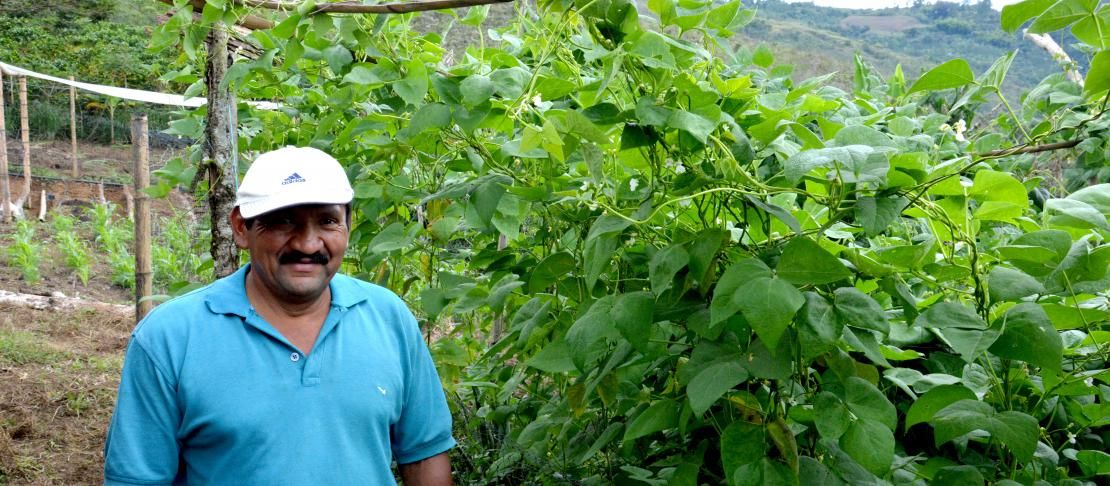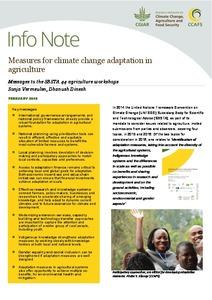Adapting to climate change in agricultural systems: update from the Bonn climate talks

Countries share their recipes for adapting agriculture to climate change, and their recommendations to the UN Climate talks.
Now that adapting agriculture to climate change is firmly on the agenda in the UN climate change discussions, attention has shifted to the question of how to move ahead.
A new round of climate discussions is currently underway in Bonn, this time of the United Nations Framework Convention on Climate Change (UNFCCC) Subsidiary Bodies for Scientific and Technological Advice (SBSTA). In the lead up to these meetings, Parties were asked to prepare technical submissions on issues relating to adapting agricultural systems to climate change. To support countries in developing their submissions, the CGIAR Research Program on Climate Change, Agriculture and Food Security (CCAFS) prepared technical background papers on these topics, and provided technical advice to several countries and negotiating teams. Agriculture issues will be further discussed at two special workshops during the Bonn meetings.
At a 17 May side event, CCAFS scientists and country partners from Africa, Asia and Latin America shared their approaches and visions for enhancing food security, resilience and productivity in agricultural systems, in an effort to highlight real adaptation measures, practices and technologies that deliver positive outcomes for farmers.
Watch the video: Adapting to climate change in agricultural systems: experience from Latin America, Africa and Asia
“We know what we need to do to adapt agriculture to climate change,” said Sonja Vermeulen, CCAFS Head of Research, in her opening keynote presentation. Dr. Vermeulen offered a rich overview of adaptation in action, highlighting 18 approaches from around the world that are delivering results for farmers. These approaches were developed and implemented by CGIAR centers together with national partners and, of course, farmers.
Watch Dr. Vermeulen's presentation: Adapting to climate change in agricultural systems: Key findings from CGIAR and partners
Based on lessons learned from CGIAR experience, the building blocks for successful adaptation in agricultural systems are funding, capacity building and technology transfer, said Vermeulen. And done well, adaptation actions can also benefit gender equality, environment and greenhouse gas (GHG) mitigation.
Shaping the UNFCCC’s vision on agriculture
Country submissions to SBSTA are important for shaping the overarching system that will support national implementation. During a panel discussion moderated by Alain Vidal, CGIAR’s Director of Strategic Partnerships, a clear message emerged: we need a robust decision on agriculture under the UNFCCC. Adaptation is a process that requires a long-term vision and a practical timetable to guide action.
From the submissions on agriculture to SBSTA by regional groups and countries, a number of proposals emerged, with several points in common.
In Southeast Asia, a joint submission was prepared based on country level studies conducted by Cambodia, Indonesia, Lao PDR, Myanmar, the Philippines, Thailand and Vietnam, explained Mr. Pham Quang Huy, Deputy Head, International Integration and Investment Division, Ministry of Agriculture and Rural Development, Viet Nam. The submission by ASEAN (Association Of Southeast Asian Nations) member states, includes priorities such as creation of an evidence base, funding and capacity building, and market orientation of resilient practices such as stress-tolerant maize and rice varieties. In some cases, small amounts of funding might make “a big difference,” for example to support Lao PDR and Thailand to exchange maize varieties.
In Africa, a joint submission by the African Group of Negotiators (AGN) highlights agricultural approaches that have proven to effectively support adaptation in different farming systems. This includes improved crop and livestock breeding, investments in water and land management that can deal with droughts and floods, better agro-processing technologies that can transform the value chain, integrated pest and disease management, enhanced insurance for farmers, and better climate information services.
“We need business unusual,” said Fred Kossam, Head of Climate Change and Research Services, Ministry of Natural Resources, Energy and Mining, Malawi, who spoke on behalf of the AGN. “We need to change how we adapt agriculture in Africa. We highlighted the approaches to be supported for effective upscaling in countries,” he explained.
In Latin America, where several countries made individual submissions, similar priorities have come to light. According to Walter Oyhantcabal, Urugay’s Director of Climate Change, concrete measures such as soil conservation, soil management plans, and sustainable management of grasslands are vital. These must be underpinned by a scientific approach, to make clear the costs, benefits and impacts of different interventions, he said. Knowledge sharing among countries and regions is also vital: “We are proposing the development of a platform to contribute to the process of sharing experiences, lessons, knowledge,” he said, an idea that was echoed by Parties in informal consultations on agriculture in Bonn.
Getting to implementation
What is needed to make change happen at a large scale? Can institutions actually deliver? How do we get the basics right?
Processes under the UNFCCC must be harnessed, explained Fred Kossam, through financial and technology mechanisms. “We must rise to the challenge and make a business case for what we want to implement,” he said. But countries will need guidance on how to make the most of these opportunities.
Initiatives outside the UNFCCC can also advance implementation.
In Sub-Saharan Africa, an initiative led by the Comprehensive Africa Agriculture Development Programme (CAADP) and the New Partnership for Africa’s Development (NEPAD) are working with development agencies and science-based organisations to help 25 million farmers become more resilient and food secure by 2025.
In Southeast Asia, regional networks such as the ASEAN CRN (Climate Resilience Network) operate more informally, and act as important facilitators, explained Imelda (Dada) Bacudo, Senior Advisor and Deputy Head of Project, ASEAN-German Programme on Response to Climate Change. ASEAN CRN has developed partnerships, including with CCAFS and FAO, to support information exchange and implementation on the ground. The network also facilitated the ASEAN submission to SBSTA, the first time the regional body has made a joint submission to the UNFCCC on agriculture.
Next steps: Morocco and beyond
Participants agreed on a few basic principles. A systemic approach to change is needed: “No one measure by itself is sufficient, we need several measures,” said Oyhantcabal, citing Uruguay’s efforts to apply multiple measures in croplands and livestock sectors. Solutions should be people-centred, putting women at the core, rather than being merely gender-neutral. Also, approaches to agriculture under climate change should work with ecosystem processes, not against them.
Knowledge and technology transfer are crucial for successful implementation. From the various country submissions, we see common needs, such as supplementary irrigation, or crop and livestock breeding. Public goods investments must go beyond on-farm technologies to provide services like climate information, early warning systems and social safety nets, such as insurance for farmers. Different ministries and sectors that involve agriculture need to coordinate to deliver these public goods, as a high priority.
A decision at SBSTA can help to deliver these outcomes particularly among the world’s poorest farmers. Negotiators will continue to discuss agriculture in the formal in-session workshops and informal discussions at SBSTA this week – and then come to a decision at SBSTA 45 in Marrakesh in November.
Read more
- Info note: Climate change adaptation in agriculture: practices and technologies. Messages to the SBSTA 44 agriculture workshops
- Info note: Measures for climate change adaptation in agriculture. Messages to the SBSTA 44 agriculture workshops
- Blog: New resource on adaptation measures in agricultural systems for climate negotiators
- Blog: Best-bet agricultural practices synthesized ahead of COP22
Vanessa Meadu is Global Communications and Knowledge Manager at CCAFS. Read all our updates related to the Bonn Climate Talks and follow @cgiarclimate on twitter for live reports.
Dhanush Dinesh is Global Policy Engagement Manager at CCAFS.


